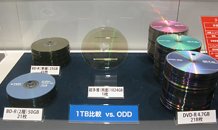- Joined
- Oct 9, 2007
- Messages
- 47,670 (7.43/day)
- Location
- Dublin, Ireland
| System Name | RBMK-1000 |
|---|---|
| Processor | AMD Ryzen 7 5700G |
| Motherboard | Gigabyte B550 AORUS Elite V2 |
| Cooling | DeepCool Gammax L240 V2 |
| Memory | 2x 16GB DDR4-3200 |
| Video Card(s) | Galax RTX 4070 Ti EX |
| Storage | Samsung 990 1TB |
| Display(s) | BenQ 1440p 60 Hz 27-inch |
| Case | Corsair Carbide 100R |
| Audio Device(s) | ASUS SupremeFX S1220A |
| Power Supply | Cooler Master MWE Gold 650W |
| Mouse | ASUS ROG Strix Impact |
| Keyboard | Gamdias Hermes E2 |
| Software | Windows 11 Pro |
Late last week, TDK demonstrated its technological prowess by displaying the prototype of a new optical disc that can hold 1 TB of data. The unnamed disc type holds data on both its sides, each with 16 recording layers, each layer holding 32 GB of data. Physically, the disc has the same diameter as today's CDs, DVDs, and Blu-ray discs at 12 cm, but is said to have double the thickness of a Blu-ray disc. It uses the same materials used in making Blu-ray discs, and also uses the same numerical aperture value of 0.85, which indicates that a player of this new medium should be able to read Blu-ray discs, too.
Many of Blu-ray's technologies (such as its video format) can also be ported to this new medium. As for propagation of the standard, TDK says that its creation is intended to be a highly proliferated standard, accessible to all classes of users from home entertainment to enterprise archival. The company, however, believes that manufacturers (of media, disc drives, and players) will have to play a bigger role in its commercialization. "Its commercialization depends on disc manufacturers," TDK said. Earlier this year, the Blu-ray disc association approved standardization of BDXL, an evolved Blu-ray disc that can hold 128 GB of data, an eighth of what this new disc can hold.

View at TechPowerUp Main Site
Many of Blu-ray's technologies (such as its video format) can also be ported to this new medium. As for propagation of the standard, TDK says that its creation is intended to be a highly proliferated standard, accessible to all classes of users from home entertainment to enterprise archival. The company, however, believes that manufacturers (of media, disc drives, and players) will have to play a bigger role in its commercialization. "Its commercialization depends on disc manufacturers," TDK said. Earlier this year, the Blu-ray disc association approved standardization of BDXL, an evolved Blu-ray disc that can hold 128 GB of data, an eighth of what this new disc can hold.

View at TechPowerUp Main Site



 Today I could backup many harddrives with "this". How slow is the write speed?? An 1x bluray = 4.5MB a sec. It would take about 60 hours to fill at 1x
Today I could backup many harddrives with "this". How slow is the write speed?? An 1x bluray = 4.5MB a sec. It would take about 60 hours to fill at 1x but i don't even have an optical drive plugged into my pc, the only time i do plug one in is for a new os install.
but i don't even have an optical drive plugged into my pc, the only time i do plug one in is for a new os install.





